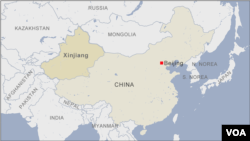The British government Tuesday announced it will set out new rules for companies to try to prevent goods from China's Xinjiang Province from entering the supply chain following allegations of forced labor and other abuses.
Speaking to Parliament, British Foreign Minister Dominic Raab said there was far-reaching and "harrowing" evidence of forced labor among Muslim Uighurs in Xinjiang after the United Nations estimated at least 1 million of them and other minorities were held in an internment camp.
Raab said other abuses include forced sterilization, extrajudicial internment, political reeducation, extensive and invasive surveillance targeting minorities, and systematic restrictions on Uighur culture, education and religion.
China denies the charges, saying it has “deradicalized” Xinjiang and that the region has not had a terrorist attack in four years.
Raab said the government must take action to make sure British businesses “are not part of the supply chains that lead to the gates of the internment camps in Xinjiang."
He said Britain would create more robust guidance for due diligence on sourcing, toughen the Modern Slavery Act to include fines, bar from government the contracts of any companies that do not comply to procurement rules, and launch a Xinjiang-specific review of export controls.
Raab also said the United Nations needed access to China's Xinjiang region to verify allegations of forced labor and other human rights violations.
Raab said Britain wants a “positive and constructive” relationship with China, but “we won't sacrifice our values or our security."





